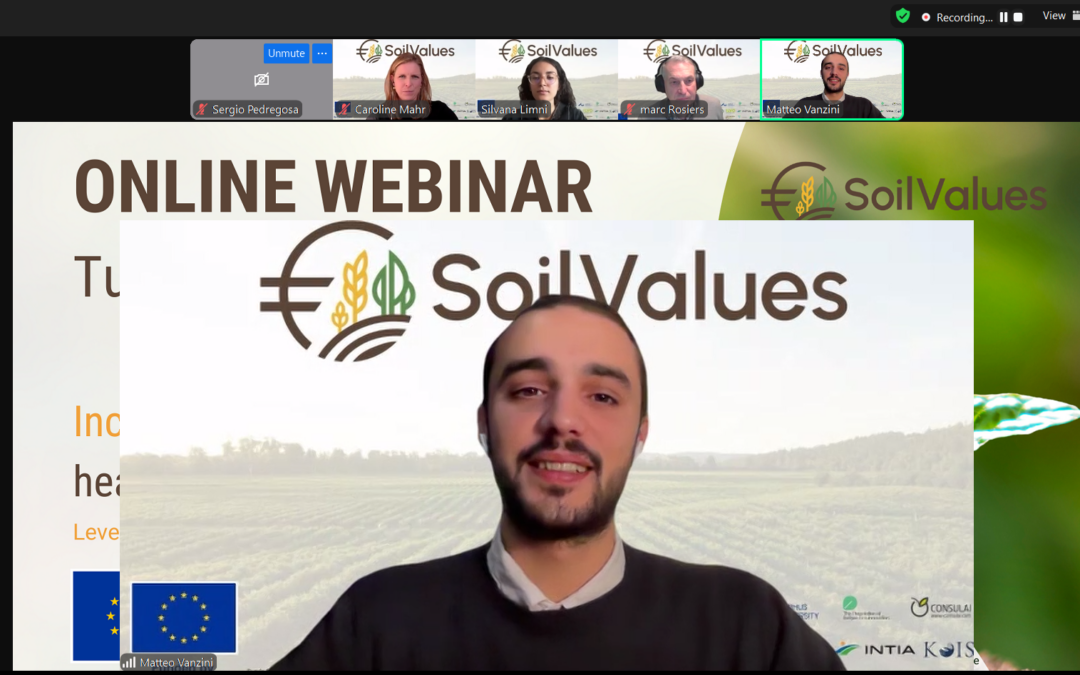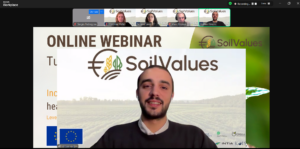Incentivising the transition to soil health, Regenerative farming practices- October, 16, 2024
Video recording here
On Wednesday, 16 October, SoilValues hosted a webinar for an exchange of views on the recently published discussion paper on designing effective incentives for the transition to soil-health, regenerative agricultural practices. Within the Horizon Europe-funded SoilValues project, KOIS has mapped public and private incentives available in Europe and in the six SoilValues pilot countries (Belgium, Denmark, Germany, the Netherlands, Poland and Portugal) and analysed how farmers can be better incentivised to improve soil quality and use viable business models for soil health. This event offered an in-depth look at the key insights and recommendations from the paper, followed by an engaging question-and-answer session among 85 participants and the panellists. The main questions focused on the integration of private incentives into the policy framework, considering CAP funding and the necessary complementarity of private funding. The main issue was the need to group all available (and yet to be developed) incentives at a single access point that encourages the uptake and supply of incentive packages through the food value chain. Prompted by the observation that no single incentive is capable of funding the transition, the webinar concluded with a call to join forces, both within stages and between stages of the agri-food chain.
The observations that 60% of soils in the EU are degraded, that in addition to carbon emissions, a wider range of factors, such as soil fertility, soil biodiversity and soil water management, require urgent action. While EU farmers are increasingly aware of the need for sustainable practices, including investment in healthier soils, they face significant economic constraints that limit their ability to take action. Policies are therefore needed that not only address these immediate financial concerns, but also provide long-term incentives for investment in sustainable practices, such as improving soil health. SoilValues aims to combat soil degradation by developing sustainable, economically viable solutions that benefit both the environment and farming communities. The project aims to improve the conditions for developing successful soil health business models by including the measurement of soil ecosystem services (which requires knowledge, indicators and models), by sharing this obtained information to facilitate monitoring, reporting and verification (MRV), and by including appropriate institutional frameworks, such as legislation, standards and good governance incentive schemes.
Regenerative agriculture has emerged as – one of – the framework to shift the focus from yield maximisation to soil health and farming profitability. The costs associated with gaining new knowledge and implementing new practices, the uncertainty linked to market conditions, and the extended time horizon required for regeneration make the transition appear daunting. Adequate support and incentives for farmers are needed to mitigate these challenges and risks. Yet no single instrument (or stakeholder providing them) is effective in isolation, and no individual mechanism can single-handedly drive farmers towards regenerative agricultural practices. Thus, tailored and comprehensive support mixing financing, de-risking, and technical support is crucial to equip farmers with the necessary resources to navigate the initial stages of the transition.”
To effectively design incentives to support soil-health regenerative farming, our recommendations highlight the need to be farmer centric and place-based, and mix practice and outcome-based targets. Blended finance can be leveraged for building place-based alliances within specific landscapes, aggregating farmers and involving multiple stakeholders to distribute risks and rewards and allow each player to contribute to the transition with what they do best. Thanks to its ability to use philanthropic and public capital to fund technical assistance, reduce financial risks and pay for outcomes, blended finance mobilises commercial capital and creates attractive investment opportunities. For the farmers, blended finance solutions provide a one-stop-shop to access a comprehensive support package and increase the resources available upfront, bridging the gap before improved profitability and soil-health outcomes make investments in regenerative agriculture more viable.
To read the full Discussion paper go to the discussion papers page of our website: DISCUSSION PAPERS – Soilvalues
For any enquiries or questions, please contact: Caroline Mahr at caroline.mahr@elo.org or Silvana Limni at ssilvana@koisinvest.com


